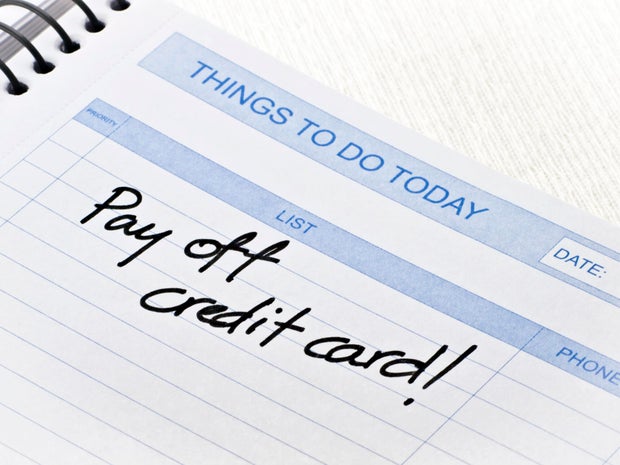 Getting rid of your credit card debt could take a while or it could be a quick process, depending on the strategy you choose.
Getty Images/iStockphoto
Getting rid of your credit card debt could take a while or it could be a quick process, depending on the strategy you choose.
Getty Images/iStockphoto
It's been a tough few years economically, especially for those with credit card debt. Not only are prices still elevated from years of inflation, but credit card interest rates are currently hovering around 22% on average. As a result, credit card debt has ballooned nationwide, and the average cardholder now owes about $8,000. For many, paying off that high of a balance feels increasingly out of reach once you factor in the compound interest charges.
Part of the issue is that the minimum payments on credit cards barely chip away at balances. So, if you're paying just the minimum required, even modest amounts of card debt can take years or decades to eliminate. If you want to expedite the process, you'll typically need to have a reliable strategy in place. But even if you have a payoff strategy in mind, the time it takes to become debt-free can depend on whether you try to tackle the debt on your own or enlist help.
But knowing your payoff timeline helps you make informed decisions about your recovery strategy, whether you're dealing with a few thousand dollars or facing a mountain of credit card debt. Below, we'll take a closer look at how long it actually takes to dig out of $8,000 in credit card debt, both with and without help.
Start taking control of your debt problems today.
How long it takes to get out of credit card debt without helpLet's say you owe $8,000 on a credit card with the current average APR of 22%, and you only make the minimum monthly payments, which are typically around 2% of your balance. That works out to about $160 per month, at least at the start.
In this scenario, it could take more than 30 years to pay off the debt and you'd pay nearly $40,000 in interest in the process. If you increased your monthly payment to a flat $250, though, you'd pay the $8,000 balance off in just over four years, and you'd pay about $4,100 in interest in total.
Explore the debt relief strategies available to you now.
How long it takes to get out of credit card debt with helpIf you're serious about knocking out $8,000 in credit card debt, you may want to consider one of your debt relief options. The right approach can significantly reduce how long it takes to pay off your credit card debt — and how much interest you pay along the way. Here's how long it could take with some of the more common debt relief strategies:
Debt consolidationA personal loan used for debt consolidation can simplify payments and lower your interest rate. As of mid-2025, borrowers with good credit may qualify for personal loan rates around 13%.
If you took out an $8,000 loan at 13% APR with a three-year term, you'd pay about $270 per month and become debt-free in 36 months. You'd pay around $1,700 in interest in total, which is much better than what you'd pay by sticking with minimum credit card payments.
Balance transferA balance transfer card lets you move your debt to a new card with a 0% introductory interest rate — typically for 12 to 21 months. If you transferred the full $8,000 and paid it off evenly over 18 months, you'd pay about $445 per month and pay zero in interest provided that you paid it off before the introductory rate period ended.
And, even if you paid a 3% balance transfer fee (of about $240), you'd still save thousands compared to paying your current card's 22% APR.
Debt managementIf you enroll in a debt management plan, the credit counseling agency you work with will try to negotiate lower interest rates with your creditors — often reducing rates to between 6% and 12% You then make monthly payments to the credit counseling agency based on what you can afford and that money is distributed to your creditors. The agency may also charge a small monthly fee. By reducing your interest rates significantly, a debt management plan typically allows you to pay off your credit card debt in just three to five years.
Debt settlementThe goal of debt settlement, also known as debt forgiveness, is to negotiate with your creditors to reduce your balances, and this strategy can sometimes lower your debt by up to 50%. The timeline for debt settlement depends heavily on how much you can afford to put away for lump-sum settlement offers as well as the time it takes to come to a settlement agreement with your creditors. In general, though, most people complete the debt settlement process within 24 to 48 months.
BankruptcyFiling for bankruptcy, particularly Chapter 7, can discharge most or all of your unsecured debt, including credit cards. It's one of the fastest ways to eliminate $8,000 in credit card debt, and can typically be completed within four to six months.
However, bankruptcy severely impacts your credit and may stay on your credit report for up to 10 years, so there are obvious tradeoffs to consider. Still, for those overwhelmed with credit card debt they can't afford to pay, filing for bankruptcy can provide an expedited route to a fresh start.
The bottom lineIf you're carrying $8,000 in credit card debt, how long it takes to pay it off depends heavily on the path you choose. Left on autopilot with just minimum payments, that balance can haunt you for decades. But with a plan — whether it's a balance transfer, a debt consolidation loan or working with a debt relief provider on another strategy — you can expedite the process and potentially save a lot of money on interest.
Angelica Leicht




